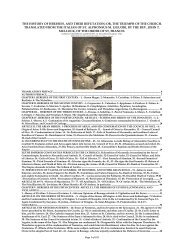The Writings of St. Francis of Assisi - + Saints' Works
The Writings of St. Francis of Assisi - + Saints' Works
The Writings of St. Francis of Assisi - + Saints' Works
You also want an ePaper? Increase the reach of your titles
YUMPU automatically turns print PDFs into web optimized ePapers that Google loves.
THE WRITINGS OF ST. FRANCIS OF ASSISI<br />
descends from the bosom <strong>of</strong> the Father upon the altar in the hands <strong>of</strong> the priest. · And just as to<br />
the holy Apostles in true flesh, so even now He shows Himself to us in the Sacred Bread. · And<br />
just as when they gazed at His very own flesh they saw only His flesh, but contemplating with<br />
spiritual eyes believed Him to be God, · so we too seeing bread and wine with bodily eyes, are to<br />
see and firmly believe, that they are His Most Holy Body and Blood, living and true. · And in<br />
such a manner the Lord is always with His faithful, just as He Himself says: "Behold I am with<br />
you even to the consummation <strong>of</strong> the age" (cf. Mt 28:20)<br />
Chapter II. On the wickedness <strong>of</strong> one's own willfulness 4<br />
<strong>The</strong> Lord said to Adam: From "every tree eat, however, from the tree <strong>of</strong> good and evil<br />
you may not eat" (cf. Gen 2:16.17). · From every tree <strong>of</strong> paradise he could eat, because while he<br />
did not go against obedience, he did not sin. · For one eats <strong>of</strong> the tree <strong>of</strong> the knowledge <strong>of</strong> good,<br />
who appropriates his own will to himself and exalts himself because <strong>of</strong> the good things, which<br />
the Lord says and works in him; 5 · and so through the suggestion <strong>of</strong> the devil and the<br />
transgression <strong>of</strong> the mandate it has become the fruit <strong>of</strong> the knowledge <strong>of</strong> evil. · Whence it is<br />
proper, that he endure punishment.<br />
Chapter III. On perfect obedience<br />
<strong>The</strong> Lord says in the Gospel: "He who" will "not" have renounced "all that he possesses,<br />
cannot be My disciple" (Lk 14:33); · and: "He who will have wanted to save his soul, shall lose<br />
it" (Lk 9:24). · That man abandons all that he possesses, and loses his own body, who <strong>of</strong>fers<br />
himself whole to obedience in the hands <strong>of</strong> his prelate. 6 · And whatever he does and says, that he<br />
himself knows, which is not contrary to his will, as long as what he does is good, is true<br />
obedience. · And if at any time the subject sees better and more useful things for his own soul<br />
than those which the prelate precepts 7 him, let him sacrifice these willingly to God; but those<br />
which are the prelate's, let him strive to fulfill. · For this is charitable obedience (cf. 1 Pet 1:22),<br />
since it satisfies God and neighbor.<br />
If indeed the prelate precepts anything against his soul, 8 though he is not to obey him,<br />
nevertheless let him not give him up. · And if he has endured persecution by others for that<br />
reason, let him love (dilectio) them more for God's sake. · For he who will endure persecution<br />
rather than wanting to be separated from his brothers, in truth remains continually 9 in perfect<br />
obedience, since he lays down "his own life" (cf. Jn 15:13) on behalf <strong>of</strong> his brothers. · For there<br />
are many religious, who under the appearance <strong>of</strong> seeing better things than those which their<br />
prelates precept, look back (cf. Lk 9:62) and return "to the vomit" <strong>of</strong> their own willfulness (cf.<br />
4 lit. propriae voluntatis, "<strong>of</strong> one's own will." But <strong>St</strong>. <strong>Francis</strong> is speaking not <strong>of</strong> the wickedness <strong>of</strong><br />
the will as such, but <strong>of</strong> a wicked manner <strong>of</strong> using the will to choose evil. On the text <strong>of</strong> this<br />
chapter, cf. Gottfried, Abbot <strong>of</strong> Admont, Homiliae domincales, XXII; PL 174, 150c.<br />
5 i.e. by means <strong>of</strong> actual graces which inspire and assist the individual in the accomplishment <strong>of</strong><br />
virtuous deeds. Since in their source they cannot be but by God's grace, <strong>St</strong>. <strong>Francis</strong> attributes<br />
them to God as his property and possession.<br />
6 A "prelate," is an ecclesiastical superior. In the next sentence "his" refers to the prelate.<br />
7 To "precept," is to issue a formal command that establishes a standard or norm <strong>of</strong> conduct.<br />
8 i.e. against the moral law.<br />
9 lit. vere permanet, "truly remains throughout."<br />
Page - 21













